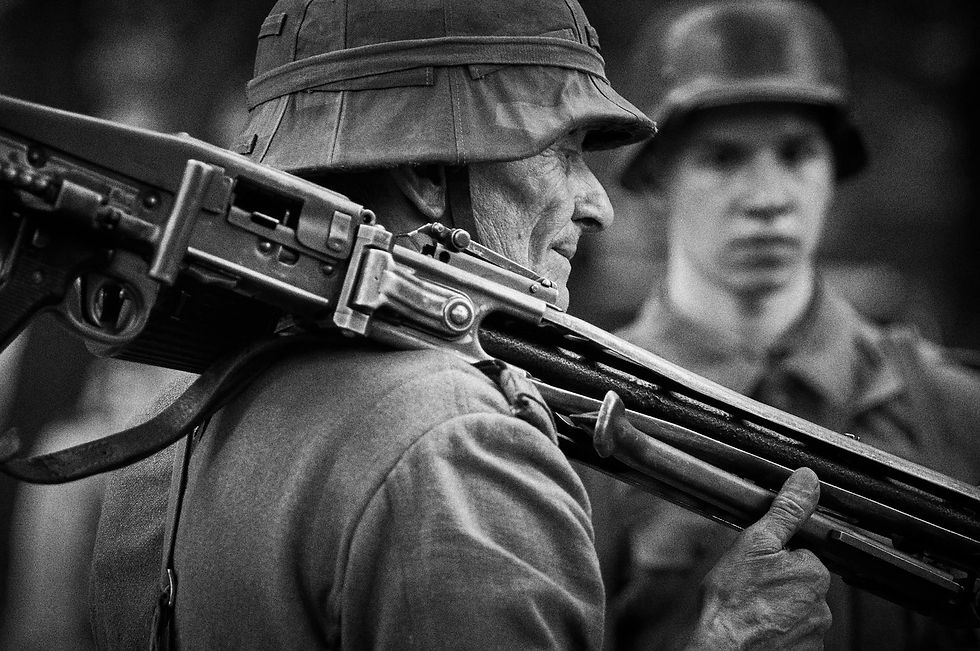Forgotten Hostages: Americans and British in Occupied France
- Isabelle Karamooz
- Nov 27, 2024
- 5 min read
Updated: Dec 1, 2024
Les Otages Oubliés - Histoire des Américains et des Britanniques internés en France sous l'Occupation is a historical work that sheds light on a relatively obscure chapter of World War II: the internment of American and British citizens in France during the Nazi occupation. While the devastating effects of the war on soldiers and civilians alike have been extensively documented, this book brings attention to a lesser-known group of individuals—ordinary citizens of Allied nations who were caught in France when war broke out, trapped under a harsh regime that viewed them as potential hostages or enemies.
The book tells their story in vivid detail, exploring not only the physical and emotional suffering these people endured but also the diplomatic complexities, the resilience of the human spirit, and the lasting impact on survivors. Through a combination of archival research, first-person testimonies, and historical analysis, Les Otages Oubliés provides a comprehensive narrative that is as enlightening as it is sobering.
The Background: A Clash of Politics and Humanity
When France fell to Nazi Germany in 1940, the country was carved into the Occupied Zone (under direct German control) and the so-called "Free Zone" governed by the Vichy regime. Both zones, however, were governed under the shadow of German influence, leading to an environment of constant tension and control. Among the many restrictive policies enacted were orders regarding foreign nationals, specifically British and American citizens, whom the German authorities considered potential bargaining tools or threats.

Photo Credit: igovar igovar: https://www.pexels.com/photo/grayscale-photo-of-man-holding-rifle-4654986/
While the United States initially maintained neutrality in the war, many American citizens were in France as tourists, expatriates, or students when hostilities began. After the U.S. entered the war in 1941, these civilians found themselves on enemy soil. The British citizens, as representatives of an already active Allied nation, faced immediate suspicion and detainment, while American citizens gradually came under similar scrutiny. The Nazi regime, with its policy of leveraging civilians for political and military advantage, began to systematically intern these “enemy aliens” in camps scattered throughout France.
Internment Conditions: The Forgotten Camp Lives
One of the most striking aspects of Les Otages Oubliés is its depiction of the internment camps where thousands of Americans and Britons were held, often under grim and inhumane conditions. These camps, managed by the Vichy regime in coordination with the German authorities, were rudimentary and frequently overcrowded. Sanitation was poor, food supplies were scarce, and the psychological toll of confinement without clear reasons or a set timeline for release was immense.
The book describes how these internment facilities ranged in type and severity. Some were converted prisons, while others were improvised camps in dilapidated buildings or hastily constructed barracks. The French Vichy administration, while under orders from the German authorities, struggled to manage the camps efficiently, leading to a complete lack of adequate resources. This neglect left detainees in states of malnutrition and vulnerability to illness, exacerbating their suffering.
The voices of the internees themselves, captured through letters, diary entries, and post-war testimonies, give the book an intensely personal dimension. Through these first-hand accounts, readers gain insight into daily life within the camps—the sparse meals, the strict schedules, the demeaning inspections, and the constant presence of guards. These narratives reveal not only the physical hardships but also the psychological struggle to maintain hope amid uncertainty and fear. For many, the camps were places of despair, but for others, they became places of resilience and unexpected camaraderie.

Photo by Suzy Hazelwood: https://www.pexels.com/photo/stacked-of-letters-in-grayscale-photography-5207503/
Diplomacy and Bureaucracy: The Complexity of Hostage Situations
One of the book’s most thought-provoking sections explores the international diplomacy and bureaucracy surrounding these internments. Given their status as civilians rather than military personnel, the detained Americans and Britons fell into a grey area of international law. The Germans held them as potential leverage, possibly to exchange them for German prisoners held by the Allies or as a means of pressuring the American and British governments into concessions.
The Vichy government found itself in a particularly difficult position. As an autonomous regime under German influence, it had to manage these camps and the hostages within them, balancing German demands with its own limited resources and political constraints. Vichy officials often clashed with German authorities over camp conditions, prisoner releases, and even the number of detainees, revealing the fraught nature of this complex power dynamic.
Throughout Les Otages Oubliés, readers see how efforts to release the internees were met with numerous obstacles. American and British diplomatic channels were limited, and the emerging war tensions strained negotiations even further. For many of the detainees, the lack of clear answers from either side added to their torment, leaving them in a seemingly endless waiting game where hope and despair were constant companions.
Profiles in Resilience: Stories of Survival and Unity
While the internment experience was grueling, it also fostered unexpected relationships among the internees. Les Otages Oubliés is filled with stories of resilience, where individuals came together to form support networks, sharing what little they had to help each other survive. Despite their national differences, British and American detainees created micro-communities within the camps, forming friendships that would last long after the war.
The internees organized cultural events, religious services, and even educational activities to keep their spirits up. By engaging in small acts of resistance—such as smuggling letters to family members or collaborating to improve their living conditions—the detainees maintained a sense of agency, however limited it was. These collective efforts served as a lifeline, providing psychological resilience that proved crucial to their survival.
The book also highlights the individual stories of certain internees, including artists, writers, and intellectuals who used their talents to uplift those around them. Through sketches, poems, and even impromptu performances, these individuals transformed their suffering into expressions of hope, creativity, and defiance against their captors. Their stories are a reminder that even in the darkest circumstances, the human spirit has the capacity to endure and resist.

The Legacy of the Forgotten Hostages
The experiences of these internees had lasting effects on those who survived. After the war, many former detainees struggled with the psychological impact of their internment, experiencing what we would now recognize as post-traumatic stress. The book discusses how the trauma of confinement, malnutrition, and constant surveillance left emotional scars that would take years to heal.
Les Otages Oubliés brings attention to a forgotten group of individuals who, despite not being soldiers, bore the burden of war in a different but equally harrowing way. The author delves into the post-war years, exploring how the former hostages grappled with their memories and fought for recognition. Many felt overlooked by history, their sacrifices minimized or ignored amid the larger narratives of the war.
In recent years, however, there has been a growing interest in commemorating these civilians and acknowledging their unique experiences. This book contributes to this effort, providing a comprehensive and respectful account that ensures their stories are not forgotten. Through its meticulous research and heartfelt storytelling, Les Otages Oubliés stands as a tribute to these individuals and a reminder of the many ways that war impacts innocent lives.
The Importance of Remembering the Forgotten
Les Otages Oubliés - Histoire des Américains et des Britanniques internés en France sous l'Occupation is more than just a history book; it’s a powerful testament to the resilience of the human spirit and the importance of remembering even the most obscure chapters of history. By shining a light on these forgotten hostages, the book adds depth to our understanding of World War II and broadens our appreciation of the individuals who lived through it.
In revealing the stories of these American and British civilians, Les Otages Oubliés challenges readers to consider the impact of war on those who are often left out of the historical narrative. It reminds us that war’s reach extends far beyond the battlefield, touching the lives of ordinary people in extraordinary ways. As readers, we are left with a renewed sense of empathy and a deeper understanding of the sacrifices made by so many. To discover these powerful stories, Les Otages Oubliés is available worldwide, including in the United States, and can be purchased in both French by clicking HERE and English editions HERE.
Header Photo Credit: Suzy Hazelwood: https://www.pexels.com/photo/stacked-of-letters-in-grayscale-photography-5207503/




Kommentare